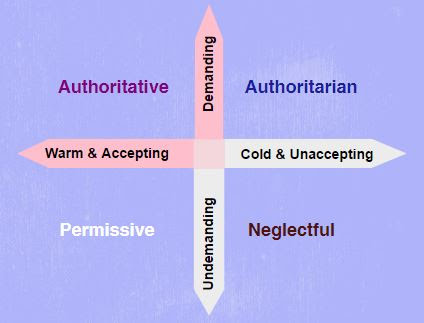Favorable outcomes of the authoritative parenting style are consistent with Caucasian samples, but there's limited published empirical research investigating the relationship between authoritarian parenting styles and adolescent adjustment outcomes using Asian or non-Caucasian samples.
This study shows that autorotate parenting style is not universally associated with negative adolescent outcomes.
"The authoritarian parenting style has acquired a negative connotation in Western literature, primarily because of the negative child and adolescent outcomes frequently associated with it. Parenting styles among Asian parents (in particular, Chinese parents) have been variously described as “authoritarian”, “controlling”, “restrictive” and “hostile” (Lin & Fu, 1990; Steinberg, Dornbusch, & Brown, 1992). Scoring high on authoritarianism may have different meanings and implications for Asians than for Caucasians due to their different cultural systems. For Caucasians, “strictness” may be equated with negative characteristics such as parental hostility, aggression and dominance, but for Asians, “strictness” and some aspects of “control” may be equated with positive characteristics such as parental concern, caring or involvement (Chao, 1994; Lau & Cheung, 1987). Chao (1994) introduced the notion of chiao shun or “training” which emphasizes the importance of parental control and monitoring of children’s behaviors, while providing parental involvement, concern and support. Training emphasizes obedience, self-discipline, and the need to do well in school. The notion of training overlaps somewhat with Baumrind’s authoritarian parenting style which may explain why Chinese and other Asians and Asian Americans score high on the authoritarian parenting style. The notion of guan is also important to understand in the context of parenting. Tobin, Wu, and Davidson (1989) explained that the term guan literally means “to govern”, and further explained that the term has a positive connotation in China because it can mean “to care for”, “to love”, as well as “to govern”. Hence, “control” and “governance” not only have very positive connotations for Asians, they are also regarded as role requirements of responsible parents and teachers. Given the possibility of authoritarian parenting style having different meanings for different cultural groups, it is not surprising then that authoritarian parenting style has been associated with both positive and negative adolescent adjustment outcomes."
"In some studies employing non-Caucasian samples, beneficial effects of authoritarian parenting have been documented. For example, Baumrind (1972) found a positive relationship between authoritarian parenting style and independence / self-assertiveness in a sample of African-American children. Similarly, Gonzalez, Greenwood, and Hsu (2001) found mother’s authoritarianism to be related to mastery orientation (defined as seeking challenges, persisting in the face of difficulty, competent and self-reliant) among AfricanAmerican undergraduate students."
"Authoritarian parenting style could possibly have a different cultural meaning for individuals who are not of European descent, hence it is not associated with solely negative adolescent outcomes. In fact, both positive and negative adolescent outcomes have been found, and this study using cluster analysis, confirmed a twocluster typology which predicted meaningful differences in Singapore."
"The results provided some support that adolescents who perceived their parents’ style of parenting as authoritarian are not a homogeneous group. Consistent with the literature, an authoritarian parenting style is not universally associated with negative personal, social and school-related adolescent outcomes, especially with Asian samples."
Download the pdf for the study here



